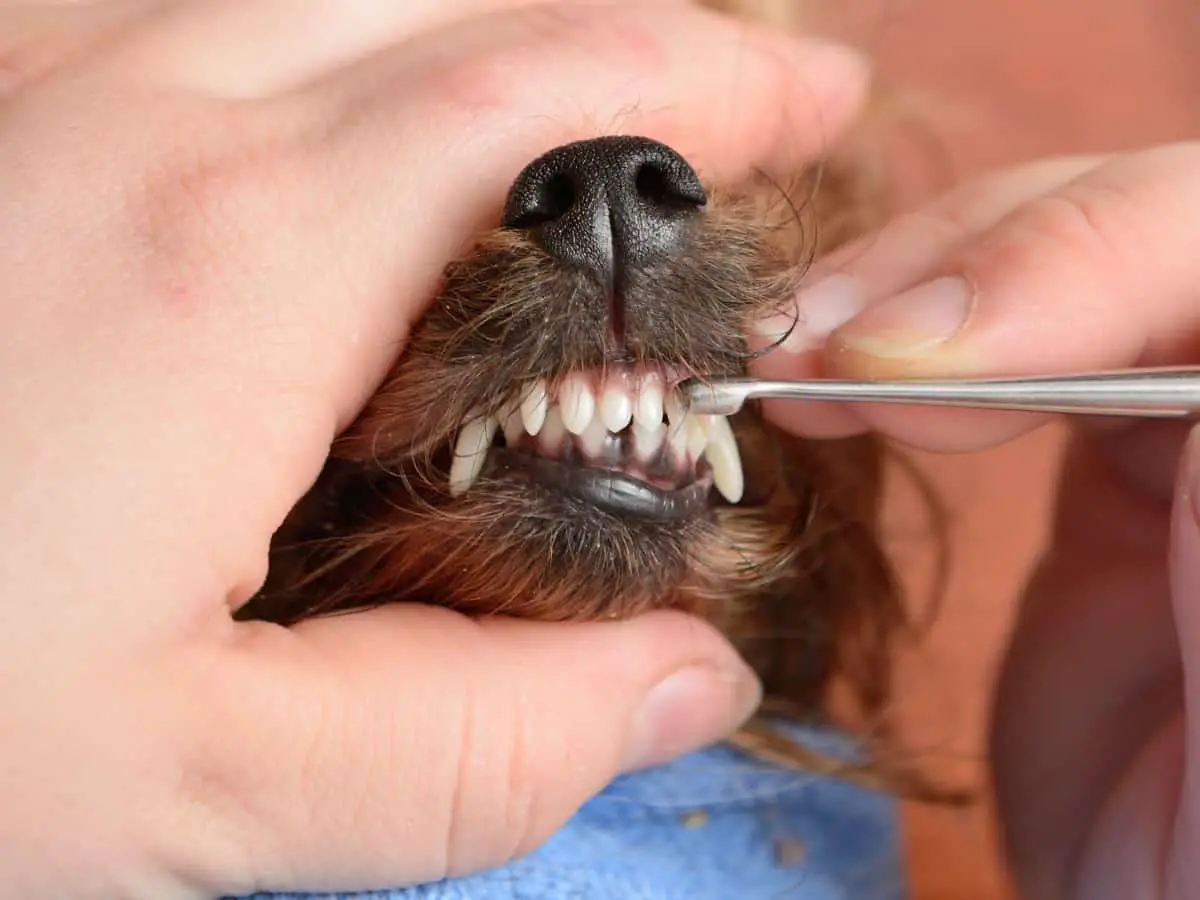Affiliate Disclosure: This post may contain affiliate links. If you make a purchase after clicking on these links I will be compensated at no extra cost to you. However, I never recommend anything I don’t love or wouldn’t use myself!
If you’ve recently acquired a Yorkie, you will most likely have some questions on health, hygiene, and even dental care. The latter may be particularly pertinent if you have a Yorkie on the younger side of life as you may be wondering…
Is it normal for Yorkies to lose teeth? Yorkies lose their deciduous baby teeth which are replaced with permanent ones as they transition from puppyhood to adulthood. This usually occurs somewhere between 4 and 8 months of age. Yorkies may also lose their adult teeth if their dental hygiene is poor.
Unfortunately, Yorkies are fairly prone to dental issues. A Yorkie’s teeth will need to be cleaned and maintained often to avoid decay, disease and even liver problems. Let’s cover some of the issues you may encounter and how you can help to prevent their adult teeth from falling out also!
Do Yorkies Teeth Fall Out?
Although it may be somewhat alarming to find your dog’s teeth laying around the house, so long as they are between 4 and 8 months of age it’s probably nothing to worry about as this is all part of the natural process of growing up.
As mentioned, if your dog loses their adult teeth, it is most like down to poor dental hygiene or another underlying issue. If this is the case for your Yorkie, you should take them to the vet to determine the cause and to make a plan of action.
Yorkie puppies’ baby teeth should fall out on their own when permanent teeth start to grow underneath. In fact, if they don’t fall naturally, this may cause problems for your pet.
From the age of 3 weeks, your Yorkies milk teeth should begin to grow and they should all be most of the way there by 8 weeks of age. This initial set of deciduous teeth will include incisors, canine/fangs, and premolars. There should be approximately 28 teeth in total.
From the age of 4 months, Yorkies adult teeth should begin to grow, forcing their milk teeth to fall out. This process should be completed by the time they are 8 months old. This second set of permanent teeth should include incisors, canine/fangs, premolars, and molars, numbering approximately 42 in total.
What If My Yorkies Teeth Don’t Fall out Naturally?
In some cases, your Yorkie puppy may not lose all of their milk teeth on time as expected. If so, here are some of the issues that may occur:
- The puppy’s gums absorb the roots of deciduous teeth causing misaligned growth of permanent teeth. The permanent teeth end up growing in odd positions.
- The teeth can get decayed as food is prone to get caught between the baby teeth and permanent teeth below it.
- The milk teeth remain for weeks after the permanent teeth are formed. In this case, surgery could be needed to remove milk teeth and to adjust the unaligned permanent teeth.
- Periodontal (gum) diseases are common when teeth are grown over-crowded. This is fairly common in Yorkies due to their small jaw size.
How to Prevent or Correct Loose Teeth in Your Yorkie
Although milk teeth fall out naturally during the specific period when they are replaced by permanent teeth, there are times when your puppy’s teeth can get loosened and fall out prematurely. In some cases, this could even happen to your adult Yorkie’s permanent teeth.
Loose teeth can be prevented by:
- Tooth Brushing Daily
- Offering safe toys for chewing
- Annual Veterinarian checkups
A few causes for Loose teeth are:
- Trauma, injury or accidents
- Periodontal diseases causing inflamed gums and infected tissues around the teeth
- Cancer in the jawbones or gums
Unfortunately, loose teeth will require a professional vet to correct. They cannot improve on their own. The vet will examine your pet and might request some blood tests to identify any underlying problems and evaluate its readiness for minor surgery.
The vet will then anesthetize your Yorkie to extract a loose tooth and then carry out thorough dental cleaning. This can include a dental examination, x-rays, cleaning, and polishing – and can take anywhere from 45 minutes to over an hour. With an extraction, the entire process can take 2 hours or more.
Anesthetic is used to offer your pet a comfortable holistic examination and surgery. This can also help your Yorkie remain calm while free of anxiety and pain.
Do Yorkies Chew While Teething?
You may often encounter your puppy gnawing on your favorite pair of sneakers or any other accessible things like papers, magazines, keys or racks that you may want to keep away from him or her. They often chew for the following reasons:
- Boredom
- Teething
- Anxiety
- Need for attention
How to Soothe Teething Symptoms and Behavior
Keep things out of reach of your teething Yorkie. When they start teething between 4 to 8 months old, it is often recommended to stow things away out of your puppy’s reach. Teething causes their gums to itch so much that the pup usually resorts to chewing anything and everything to relieve them.
You should tuck away all the cords and wires in your home for your puppy’s safety. Immovable furniture can be sprayed with apple-bitter spray on the parts that are accessible to the little chewing whelp. The bitter taste will help to discourage them.
Give your Yorkie plenty of safe, chewable toys. A hodgepodge of toys varying in texture and size can keep them curious and entertained while they experiment and discover what feels best in their mouths.
Toy tip: a couple of pet toys are made to be frozen as puppies enjoy playing with sliding toys, and the cold helps them soothe their inching gums. You can become creative by freezing the toys after immersing with chicken broth or any flavor that could mesmerize your puppy.
Here are some of Amazon’s Best Selling chew toys that can keep your puppy busy and happy.
Why Should You Clean Your Yorkie’s Teeth?
Like how you clean your teeth for your own health, your puppy’s teeth must be brushed at least two to three times each week to maintain healthy gums and teeth.
Food that gets trapped in between its teeth can cause plaque and bacteria to develop on the surface. This can spread and damage the other parts of its body.
Poor oral hygiene could lead to serious diseases like:
- Periodontal disease
- Heart and kidney problems.
- Swollen gums and tooth loss
Your puppy can become moody and anxious when it doesn’t feel well due to oral health issues.
Never use human toothpaste to clean your Yorkies teeth. Most contain fluoride which is extremely poisonous for dogs.
Be sure to purchase a toothpaste which has been formulated especially for dogs. These lather less and are formulated with a taste your dog should enjoy.
You may schedule your puppy for a periodic visit to the vet once a year for professional teeth cleaning and hygiene, although this can be expensive so it’s best to try to keep on top of it yourself.
How do you Clean Your Yorkie’s Teeth?
Your puppy can be reluctant to allow you to stick a toothbrush inside its mouth for the very first time. The techniques below can help you get your puppy accustomed to regular oral hygiene.
The art of cleaning your puppy’s teeth begins where you get him or her accustomed to the process of cleaning.
Tips for getting started:
- Buy your necessary supplies:
- specially formulated dog toothpaste
- toothbrush with softer bristles (you can buy one especially designed for pets which may be kinder on your pet’s gums)
- Massage your puppy’s gums, teeth, and lips in slow circular motions once or twice a day for about a minute with your fingers. This may get them used to gum massage.
- Introduce the toothpaste in small quantities and reward them with treats when they co-operate. It is recommended to use your fingers with a small quantity of toothpaste initially.
- Introduce the toothbrush and allow your puppy to lick it. Rewarding them in between can work wonders in training them.
After you have gotten your puppy acclimatized, you can try brushing your puppy’s teeth for about 30 seconds to 1 minute. You could start from one area and continue in parts with short breaks in between if needed.
You may want to create a fun session for your puppy to enjoy the process of brushing with their favorite toys and tricks.
The following clip explains how to clean your dog’s teeth well.
If your puppy still hates to brush, you may want to resort to alternatives like food and water additive sprays, wipes or pet dental chews. A vet can best advise you on what is good for your pet.
I personally have a Yorkie who came to me at the age of 4 and she was not used to having her teeth cleaned at all. I tried out these Pet Tooth Wipes (link to amazon) which I highly recommend.
They are a great option for any dog who hates having their teeth cleaned as they are very gentle on them. The first time I used them, I was actually shocked at the color of the wipe when I was done. They make my Yorkies breath smell great too!
In Conclusion
It is very normal for a Yorkie to lose teeth during the early stages of physical development. Thereafter, however, your Yorkie’s adult teeth will have to be maintained with regular care to stay healthy. Good oral hygiene has the same benefits for dogs as it does for humans. Taking good care of teeth and gums is good for your Yorkie’s overall health.

